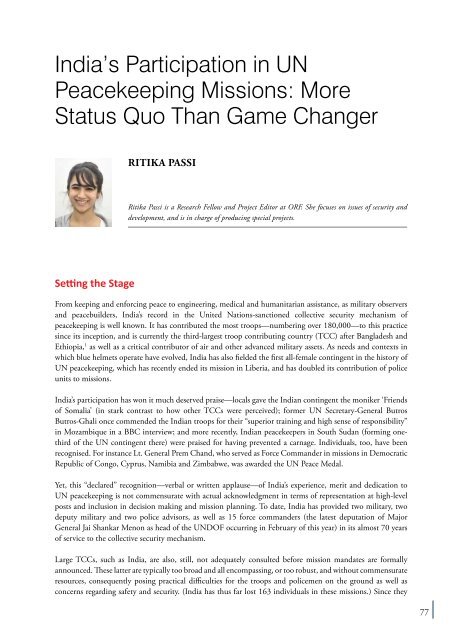Defence Primer
Military_Layout
Military_Layout
Create successful ePaper yourself
Turn your PDF publications into a flip-book with our unique Google optimized e-Paper software.
India’s Participation in Un<br />
Peacekeeping Missions: More<br />
Status Quo Than Game Changer<br />
Ritika Passi<br />
Ritika Passi is a Research Fellow and Project Editor at ORF. She focuses on issues of security and<br />
development, and is in charge of producing special projects.<br />
Setting the Stage<br />
From keeping and enforcing peace to engineering, medical and humanitarian assistance, as military observers<br />
and peacebuilders, India’s record in the United Nations-sanctioned collective security mechanism of<br />
peacekeeping is well known. It has contributed the most troops—numbering over 180,000—to this practice<br />
since its inception, and is currently the third-largest troop contributing country (TCC) after Bangladesh and<br />
Ethiopia, 1 as well as a critical contributor of air and other advanced military assets. As needs and contexts in<br />
which blue helmets operate have evolved, India has also fielded the first all-female contingent in the history of<br />
UN peacekeeping, which has recently ended its mission in Liberia, and has doubled its contribution of police<br />
units to missions.<br />
India’s participation has won it much deserved praise—locals gave the Indian contingent the moniker ‘Friends<br />
of Somalia’ (in stark contrast to how other TCCs were perceived); former UN Secretary-General Butros<br />
Butros-Ghali once commended the Indian troops for their “superior training and high sense of responsibility”<br />
in Mozambique in a BBC interview; and more recently, Indian peacekeepers in South Sudan (forming onethird<br />
of the UN contingent there) were praised for having prevented a carnage. Individuals, too, have been<br />
recognised. For instance Lt. General Prem Chand, who served as Force Commander in missions in Democratic<br />
Republic of Congo, Cyprus, Namibia and Zimbabwe, was awarded the UN Peace Medal.<br />
Yet, this “declared” recognition—verbal or written applause—of India’s experience, merit and dedication to<br />
UN peacekeeping is not commensurate with actual acknowledgment in terms of representation at high-level<br />
posts and inclusion in decision making and mission planning. To date, India has provided two military, two<br />
deputy military and two police advisors, as well as 15 force commanders (the latest deputation of Major<br />
General Jai Shankar Menon as head of the UNDOF occurring in February of this year) in its almost 70 years<br />
of service to the collective security mechanism.<br />
Large TCCs, such as India, are also, still, not adequately consulted before mission mandates are formally<br />
announced. These latter are typically too broad and all encompassing, or too robust, and without commensurate<br />
resources, consequently posing practical difficulties for the troops and policemen on the ground as well as<br />
concerns regarding safety and security. (India has thus far lost 163 individuals in these missions.) Since they<br />
77


